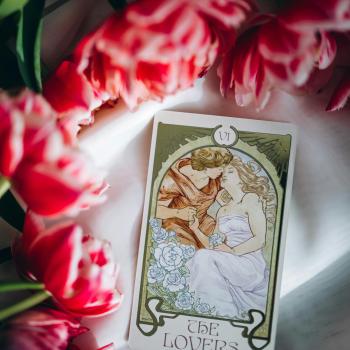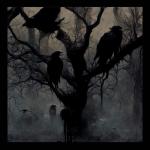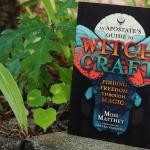 It sometimes feels as if every word used to describe someone of the Pagan Persuasion is problematic. The word Pagan is so full of problems that people have been running from it the last few years. Witch isn’t much better, having several different definitions depending on the circumstance. (I’m not implying that all Witches are Pagans or vice versa, simply that both words have several meanings.) The word Wicca has become just as problematic as Pagan and Witch, something that a recent post on Sermons From the Mound brought home with vivid clarity.
It sometimes feels as if every word used to describe someone of the Pagan Persuasion is problematic. The word Pagan is so full of problems that people have been running from it the last few years. Witch isn’t much better, having several different definitions depending on the circumstance. (I’m not implying that all Witches are Pagans or vice versa, simply that both words have several meanings.) The word Wicca has become just as problematic as Pagan and Witch, something that a recent post on Sermons From the Mound brought home with vivid clarity.
Weirdly, Yvonne’s post had nothing to do with the definitions of words and wasn’t meant to be a critique of how the word Wicca is used, but that’s what I got out of it. Several times in the piece Yvonne makes references to “watered down Wicca,” “bastardization,” and the “misinterpretation of real Wicca.” I don’t think Yvonne is purposefully trying to be offensive, and as an initiated Witch, I’m completely sympathetic to what she’s articulating, I just don’t agree with it.
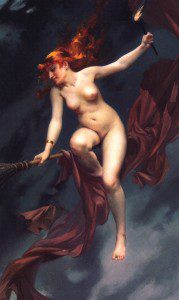 Wicca was originally meant to be a term that applied only to people who were initiated into a specific tradition of Witchcraft. There was no way to become a “Wiccan” (or become one of “the Wicca”) without an initiation. This was the system of Gerald Gardner (or perhaps his initiators), his initiates, and later his imitators and admirers. Almost every “Wiccan Tradition” owes a tip of the hat to Gardner, his system became the dominant one (even in traditions that might have predated Gardner, this is called the “Gardnerian Magnet” by scholars), and most groups that use the word “Wicca” can trace their origins to Gardner, one of his followers, or his Book of Shadows.
Wicca was originally meant to be a term that applied only to people who were initiated into a specific tradition of Witchcraft. There was no way to become a “Wiccan” (or become one of “the Wicca”) without an initiation. This was the system of Gerald Gardner (or perhaps his initiators), his initiates, and later his imitators and admirers. Almost every “Wiccan Tradition” owes a tip of the hat to Gardner, his system became the dominant one (even in traditions that might have predated Gardner, this is called the “Gardnerian Magnet” by scholars), and most groups that use the word “Wicca” can trace their origins to Gardner, one of his followers, or his Book of Shadows.
In certain situations the idea that the word Wiccan can only refer to an initiate is perfectly acceptable. If I’m on an “Alexandrians Only” Facebook group and their definition of the word Wicca only includes lineaged* initiates than I have to run with that definition. It’s the original definition of the word, and it’s what I agreed to when I signed up for. I may not completely agree with it, but in that certain situation I have to accept it. The problem occurs when someone tries to police the word Wicca outside of that specific context. What might be “watered down Wicca” to some might also be an extremely important and valid form of religious expression to someone else.
There are a few definite “fork in the road” moments when it comes to the use of the word Wicca. The first one occurred in the early 1970’s when the first “how to” books began to appear. Now nearly anyone could get their hands on a version of Gardner’s system, which was especially appealing in the United States, a country far too big to make an “initiation only” Witchcraft viable. (We are certainly not “Gardnerians All,” but the influence of Gardner’s system is impossible to ignore.) By 1975 there were complete collections of Witch Rituals available, most notably Raymond Buckland’s The Tree (which uses the term Seax-Wica in the title), Ed Fitch’s Magical Rites From the Crystal Well, and Lady Sheba’s Grimoire. It became completely possible to create your own Wiccan Tradition in the privacy of your living room, as long as you were willing to change the definition of the word Wicca.
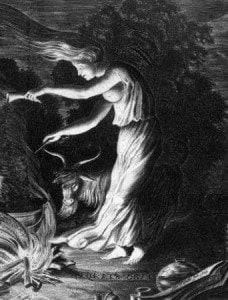 And that’s exactly what happened, during the late 1980’s, the definition of Wicca essentially changed (especially in the United States, less so in Great Britain). A lot of that change can probably be attributed to Llewellyn Publications which released Wicca: A Guide For the Solitary Practitioner by Scott Cunningham in 1988. (Cunningham’s book was not the first to feature the word Wicca in the title, but it’s been the most enduring and influential. The first book to use Wicca in the title appeared in 1981 and was entitled Wicca: The Ancient Way.) After that, the flood gates opened up and now there are probably hundreds of books with the word Wicca in them, all of them basically articulating the idea that Wicca is a spiritual practice that doesn’t require an initiation.
And that’s exactly what happened, during the late 1980’s, the definition of Wicca essentially changed (especially in the United States, less so in Great Britain). A lot of that change can probably be attributed to Llewellyn Publications which released Wicca: A Guide For the Solitary Practitioner by Scott Cunningham in 1988. (Cunningham’s book was not the first to feature the word Wicca in the title, but it’s been the most enduring and influential. The first book to use Wicca in the title appeared in 1981 and was entitled Wicca: The Ancient Way.) After that, the flood gates opened up and now there are probably hundreds of books with the word Wicca in them, all of them basically articulating the idea that Wicca is a spiritual practice that doesn’t require an initiation.
To put it bluntly, it’s impossible to control the definition of a word. Once the black cat got out of the box there was no getting it back in there. What we have now are essentially two different definitions of the word Wicca, both equally valid depending on the context. Wicca is both an initiatory tradition and a form of spirituality which can be practiced by almost anyone. If someone has thirty books with the word “Wicca” on the spine of them you certainly can’t blame them for thinking they are justified in their use of the word. The only way to put the cat back in the box would be to essentially burn every book with the word Wicca in the title, and shut down all the webpages too. That’s obviously not going to happen, and it’s probably just best to accept that things have changed and move on.
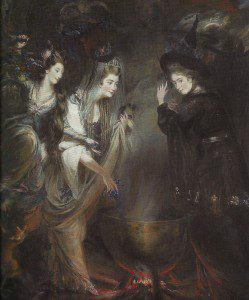 Eclectic Wicca isn’t watered down or bastardized, it’s just different from the traditional version. To the people who practice the non-initiatory forms of Wicca their rituals and rites are just as vital and real as anyone else’s. Besides, I don’t think everyone is meant to walk down the path of the initiate anyways, what everyone should do is find the system that works best for them and then use it. If someone’s version of Wicca feels a little less “serious” than my own, who cares? I don’t have to practice it that way. If there was only one proper way to practice Wicca there wouldn’t be dozens of initiatory traditions, Eclectic Wicca is simply another step along that journey. No one is suggesting that anyone can be an Alexandrian or Gardnerian**, and I believe that initiatory traditions have a long and bright future ahead of them, but it’s hard for me to see Wicca as existing only in that context. I sympathize with my cohorts who prefer the original definition of the word, change is hard, but it’s also inevitable and impossible to escape from.
Eclectic Wicca isn’t watered down or bastardized, it’s just different from the traditional version. To the people who practice the non-initiatory forms of Wicca their rituals and rites are just as vital and real as anyone else’s. Besides, I don’t think everyone is meant to walk down the path of the initiate anyways, what everyone should do is find the system that works best for them and then use it. If someone’s version of Wicca feels a little less “serious” than my own, who cares? I don’t have to practice it that way. If there was only one proper way to practice Wicca there wouldn’t be dozens of initiatory traditions, Eclectic Wicca is simply another step along that journey. No one is suggesting that anyone can be an Alexandrian or Gardnerian**, and I believe that initiatory traditions have a long and bright future ahead of them, but it’s hard for me to see Wicca as existing only in that context. I sympathize with my cohorts who prefer the original definition of the word, change is hard, but it’s also inevitable and impossible to escape from.
Given that some of Wicca’s ritual structure (and terminology) owe a great deal to Freemasonry it’s not surprising that initiation plays an important part in many Wiccan traditions. Initiation is in the very DNA of Modern Witchcraft, but it’s also possible that Wicca has grown in ways that have taken it further and further from its origins. It’s hard to picture Gerald Gardner imagining just how many Wiccan traditions have evolved (and prospered) since the 1950’s. Wicca launched a full-scale Pagan Revival that shows no signs of stopping, we’ve come an incredibly long way in just 70 years.
We’ve reached another fork in the road and with it new questions. Is Wicca a spirituality ready to take its seat at the table with the other great religions of the world? Or is it a secret society with a complex set of rituals? If it’s a faith then it’s subject to all the watering downs and bastardizations that have befallen (and often benefitted) all of the world’s other religious paths. I understand The Wicca who walk the path of the initiate and bemoan the changes that have taken place in the last couple of decades, but I also see the hearts who have benefitted from that change. Who am I to tell them they don’t have a seat at the table?
*lineaged is not a real word, but it sounds like it should be so I’m running with it.
**I’ve seen Gardnerian spelled with both an “a” and an “e,” my first draft used the “a” spelling, but after some constructive criticism (and checking a few email lists) I’ve reverted to the e spelling.




